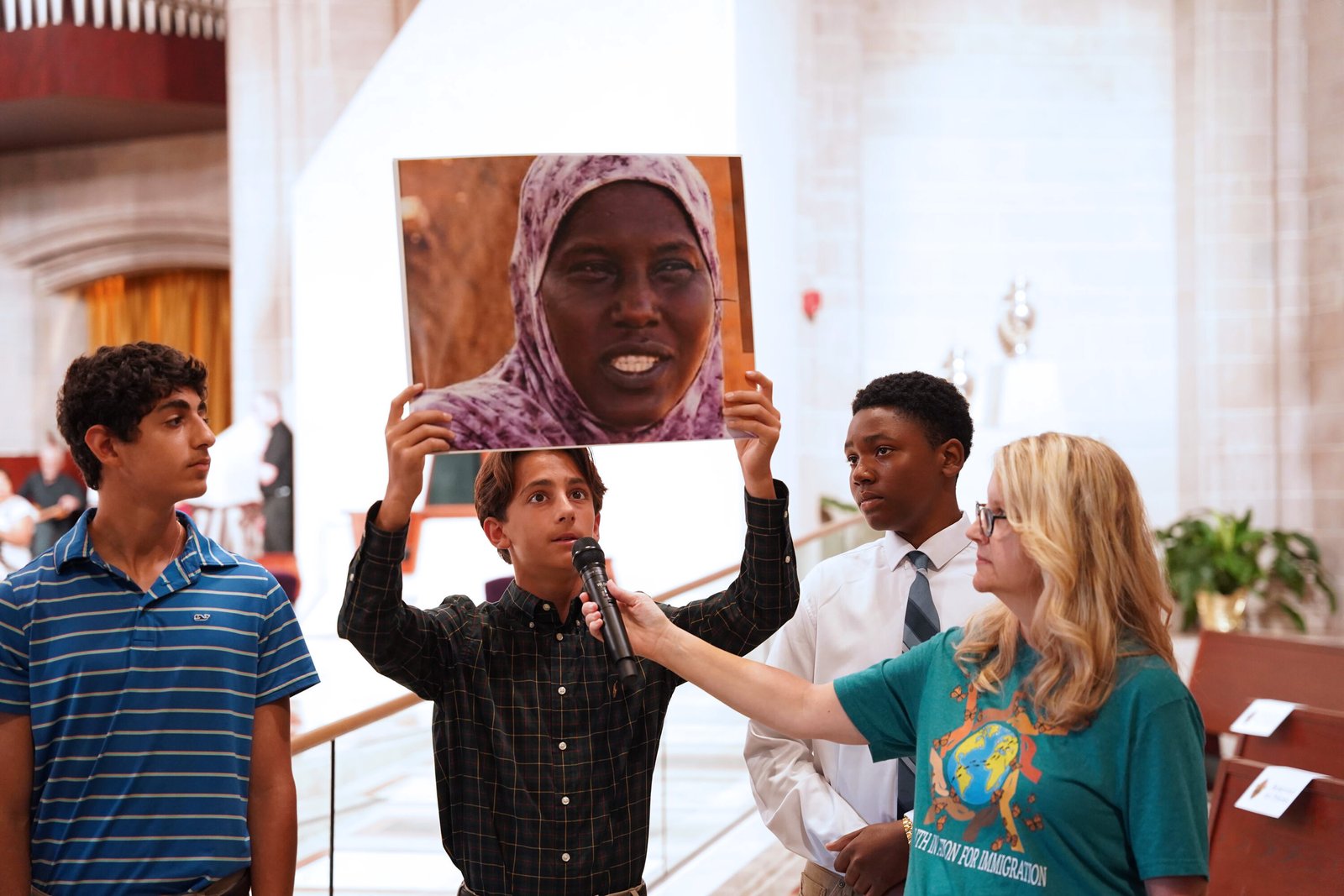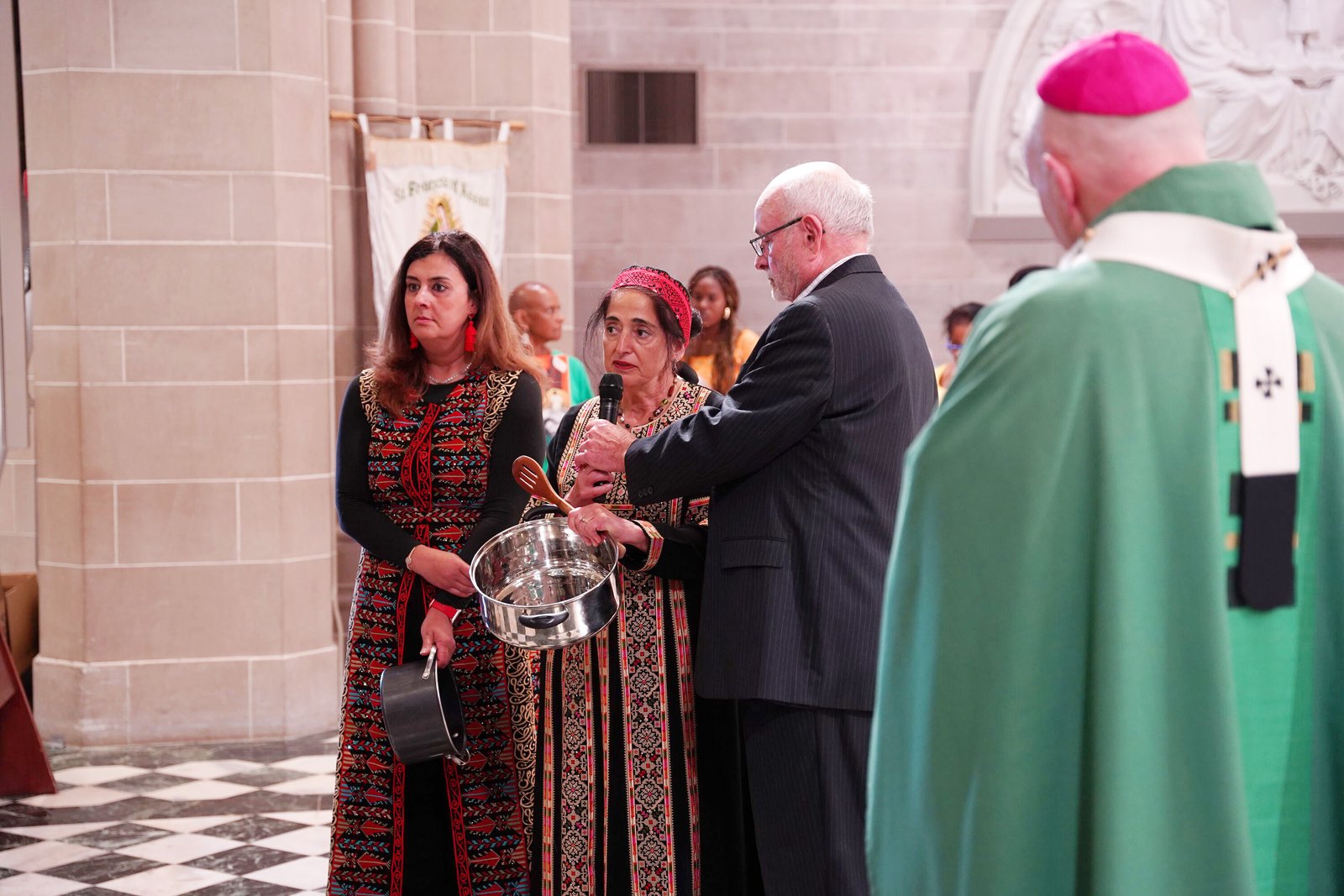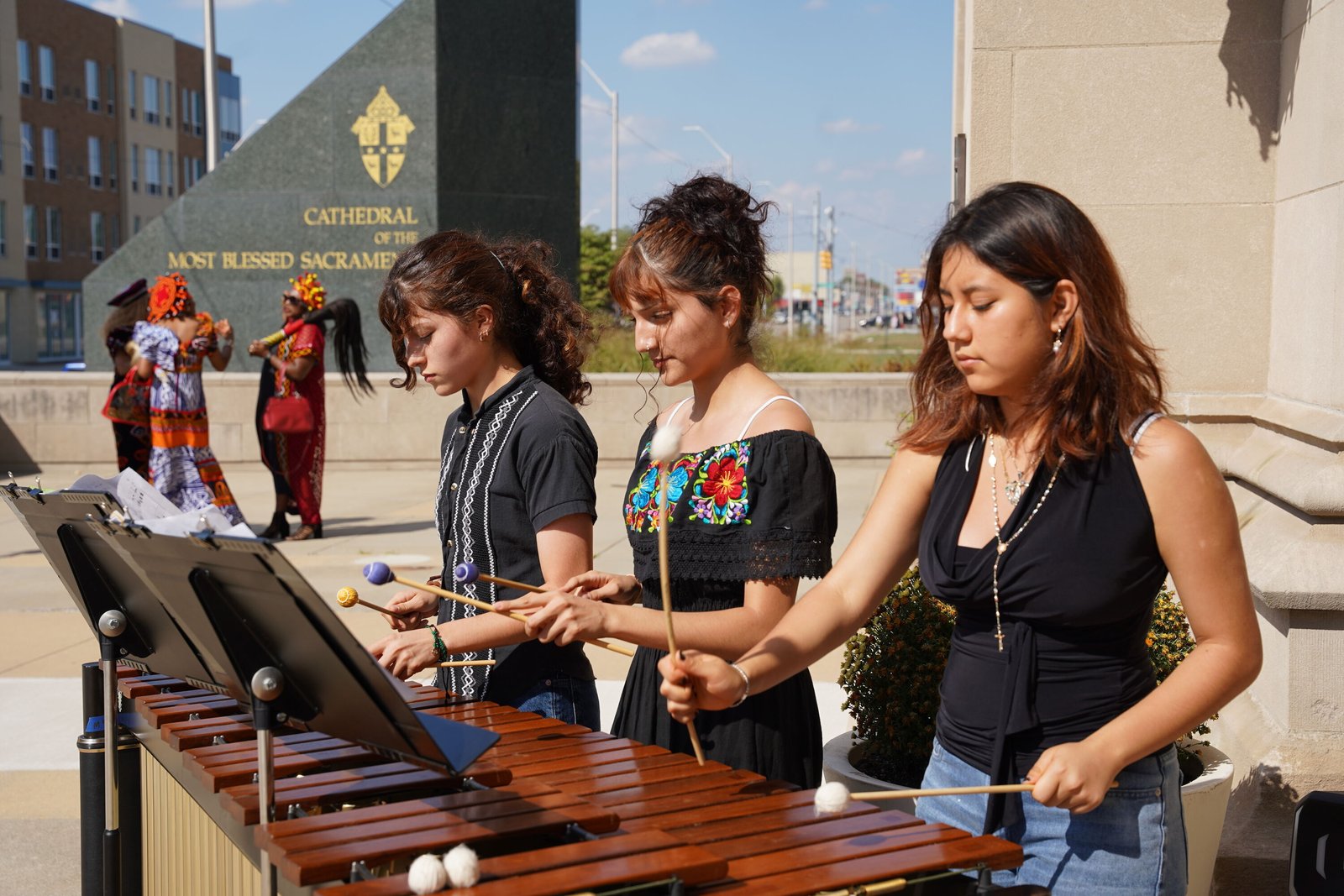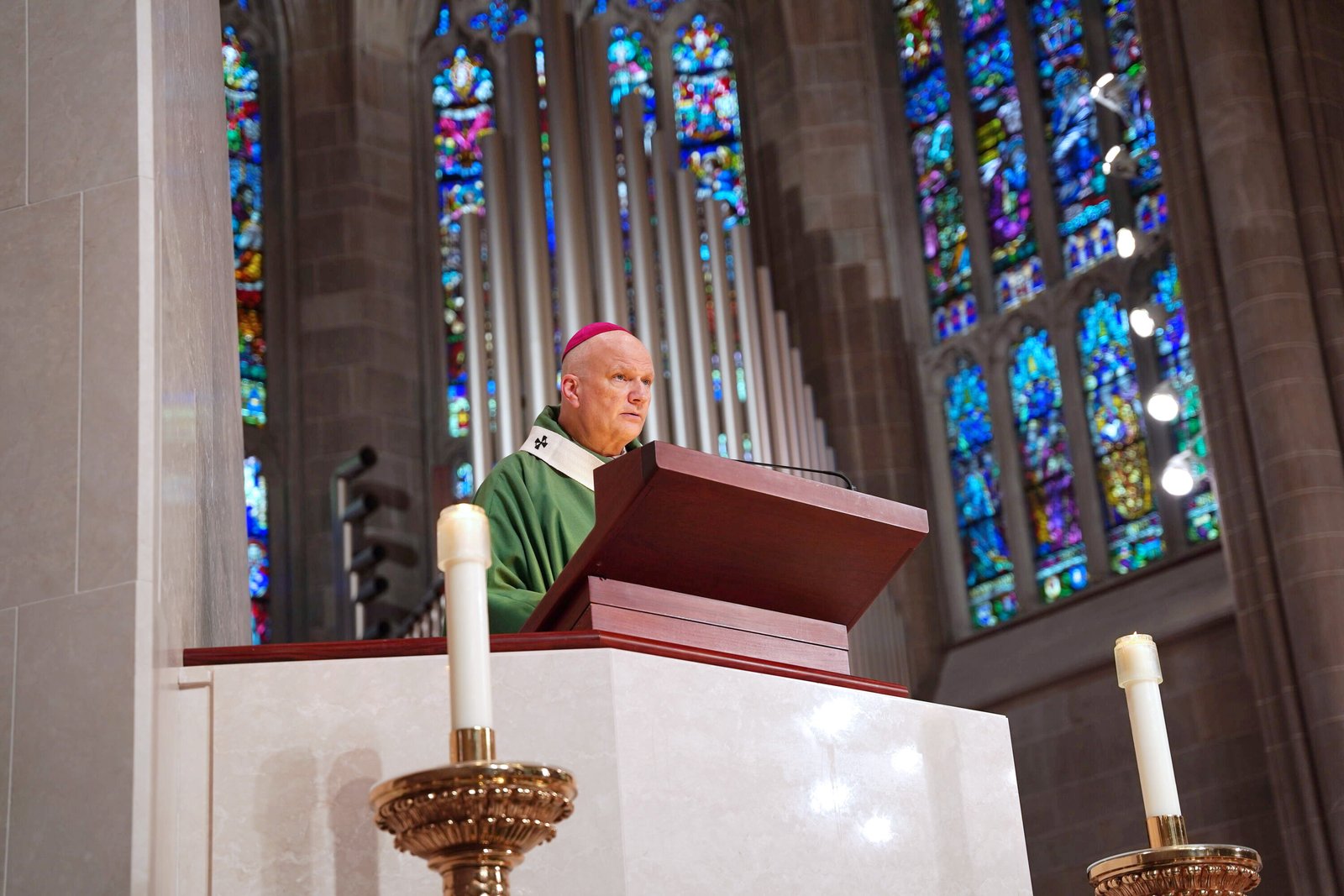During Jubilee of Migrants Mass, archbishop lauds the courage and faith of those forced from their homes, offers apostolic blessing
DETROIT — One in every 67 people on earth has been forced to flee their home.
It is a sobering statistic from a 2024 report from the United Nations Refugee Agency, which documented that more than 123 million people worldwide have been forced to escape war, violence, persecution, human rights violations, environmental catastrophes and severe economic hardship.
For this reason, the universal Church recently celebrated the Jubilee of Migrants and the Jubilee of the Missions, during which Pope Leo XIV reminded all Catholics of their duty to welcome and assist migrants and imitate God’s love for them.
Don't miss another story
Did you know you can get Detroit Catholic's latest daily or weekly articles delivered to your inbox? It's easy and free to sign up.
Locally, Detroit-based Strangers No Longer organized a Mass for the Jubilee of Migrants at the Cathedral of the Most Blessed Sacrament in Detroit on Oct. 5, when Archbishop Edward J. Weisenburger commended the group and its work in forming “Circles of Support” for migrants and refugees living in southeast Michigan.
“I'm deeply grateful for Strangers No Longer; yours is one of the extraordinary works both by the Church and for the Church,” Archbishop Weisenburger said. “Today’s celebration likewise is a reminder of the courage and the tenacity of those displaced by conflict, persecution, harsh economics, hunger, violence and more.”
The Mass was preceded by a procession around the cathedral, which featured banners calling for the humane treatment of migrants and refugees, including references to Scripture's call for the care of the stranger.


As the procession entered the cathedral, high school students read testimonies from migrants around the world, painting a picture of why millions of people every year brave oceans, deserts and jungles, leaving everything behind in hopes of finding a better life.
When — and if — migrants reach a new country that offers a chance of reprieve, they are often met by a population that is indifferent, or even hostile, to their presence, Archbishop Weisenburger said.
“An additional pain for these beloved ones who are forced to move on is the sad villanization attributed to many around the world,” Archbishop Weisenburger said. “In the face of that, I’m so proud and grateful to be Catholic.”
The archbishop recalled his previous experiences as bishop of the Diocese of Tucson, Arizona, working alongside immigrants at the Mexico-U.S. border.
“At our peak, we were serving 1,400 immigrants a day," the archbishop said. “Every one of them was brought to us by our government, Border Patrol or ICE (Immigration and Customs Enforcement). They would process these immigrants who were legal in the United States and then bring them to our doorstep.”
Archbishop Weisenburger recounted the stories of women he met in Tucson who would “crawl through broken glass” to have a better life.
“Yet around the world, these cousins of our are maligned and oftentimes harassed, if not persecuted,” Archbishop Weisenburger said. “So I think it’s fair to say that this Sunday’s universal celebration throughout the entire Catholic world is intended to help us focus our vision where it must be, and then answer that question: ‘What is a Christian? What does a disciple of Jesus do?’”
Borrowing from Pope Leo's homily earlier in the day, Archbishop Weisenburger noted how migrants can be modern-day missionaries, carrying the message of Jesus Christ from one place to another, and invigorating their new communities.


“The Holy Father knows that in a very unique way, Catholic migrants and refugees can be missionaries of great hope in the countries that welcome them, forging new paths of faith where the message of Jesus has not arrived,” Archbishop Weisenburger said. “With their spiritual enthusiasm and vitality, they can even help revitalize parishes that have become rigid and weighed down; communities where growing spiritual deserts are advancing at an alarming rate.
“Pope Leo ends his homily with a one-sentence quote from the letter to the Hebrews: ‘Do not neglect to show hospitality to strangers, for by doing so, some without realizing it have entertained angels,’” Archbishop Weisenburger added.
A tapestry of cultures
The Mass itself featured the rich tapestry of cultures in the Archdiocese of Detroit, with music provided by the Ugandan Catholic Community of Michigan Choir, the Ste. Anne de Detroit Choir, the St. Gabriel Marimba Ensemble and the Sacred Heart Choir.
Prayers of the faithful were read in Spanish, Italian, French, Gaelic and Luganda.
During the offertory, migrants and parishioners with immigrant backgrounds presented Archbishop Weisenburger with symbols from around the world, which told stories about the struggles migrants have faced and continue to face. One, a Palestinian refugee, presented an empty pot, symbolizing the continuing famine in Gaza due to the ongoing war with Israel.
Gabriel Yanuc, a native of Mexico who now lives in Greenville and attends SS. Peter and Paul Parish in Ionia in the Diocese of Grand Rapids, spoke with Detroit Catholic about why he became involved with Strangers No Longer after his wife began working with immigrants in the community.
Yanuc said he works primarily with dairy farm workers, many of whom aren't aware of the rights they have, and helps to educate them about workers' rights, health care, and protecting them against animal-borne diseases.
“There are a lot of problems our dairy workers are facing right now, so having a group like Strangers No Longer looking after them is meaningful,” Yanuc said.

After Communion, Archbishop Weisenburger blessed leaders from Strangers No Longer who will be traveling to the Arizona-Mexico border for a bi-national gathering of immigrant rights supporters, hoping to build cross-border relationships.
Amy Ketner, director of leadership development for Strangers No Longer, said the group is calling those who will be traveling "missionaries of hope."
“Right now, they are working with immigrants in their communities to gather stories that they can share with others, so we know better how to serve our friends and neighbors and get people to see the immigrants and migrants as integral parts of their communities,” Ketner said.
As part of the 2025 Jubilee Year of Hope, Archbishop Weisenburger imparted an apostolic blessing upon the assembly, which offers the possibility of a plenary indulgence, provided those receiving it receive the Eucharist and confession within a reasonable amount of time.
After Mass, attendees gathered in the cathedral courtyard to learn about Strangers No Longer and share their own cultural experiences.
Della Lawrence, director of campus ministry at Notre Dame Preparatory in Pontiac, said students at the school are working with Circles of Support to spread awareness about what can be done to help migrants in their community.


Immigration is a contentious political topic, Lawrence acknowledged, but said groups like Strangers No Longer are trying to make the discussion about people, not policies.
“You have to start from a personal perspective,” Lawrence said. “Everybody has a tradition, background, and culture they are coming from. So we start there and share with one another each other’s traditions, food or celebrations.
“Often, people don’t have a home anymore, because they had to flee,” Lawrence continued. “When we share these stories and get into the details, the conversations become more productive, and people begin to understand. Then, we can look at what can be done. It’s about not making simplistic arguments, but listening to people as people.”
Celebrations like the Jubilee of Migrants are inspiring, Lawrence added, because the entire Church shows solidarity with those who have had to leave their homes.
“This is beautiful; it’s wonderful,” Lawrence said. “Days like today bring awareness in our community. It celebrates our diversity, culture, and heritage, and it allows us to gather our thoughts as we go forth and spread our faith and hope to other people. Being Christ for another, that’s who we are.”

Concluding his homily, Archbishop Weisenburger reflected upon the Gospel reading from St. Luke, in which Jesus tells a parable of the servant commanded to fix supper for his master after working in the fields.
Like the tireless servant in the Gospel, Christian disciples are called to do the work of the Master without expecting a reward — but often finding one anyway, he said.
“Always remember that the Gospel cuts both ways,” Archbishop Weisenburger said. “It comforts the afflicted and afflicts the comfortable. And we need that tension. Think about it: to be his follower is to be entirely subject to him and yet to be free; to be lacking in any expectation of wages, only to discover we’re paid a full day’s salary for only one day, one hour of work; to work slavishly for the master, but at times to find him saying, ‘Sit down at the table. I’m putting on an apron, and I’m going to serve you.’”
When Christians serve and accompany their brothers and sisters who are immigrants, they find the same unexpected reward, the archbishop added.
“I believe today’s celebration involves first opening our eyes — understanding the real situation and seeing it through the vision of Christ,” Archbishop Weisenburger said. “In doing so, we need to, on the one hand, commit ourselves to working slavishly with no expectation of reward for the Christ we find in migrants and immigrants, while knowing in the end, in the midst of their suffering, it is they who are serving us.
“We commit them to Christ in prayer only to learn through their prayer and goodness that we are the ones who are blessed in the end,” the archbishop added. “Having served him, let us learn from them how to be a people of hope, a people on the move, a people journeying together on the way.”
Copy Permalink
Immigration and refugees












